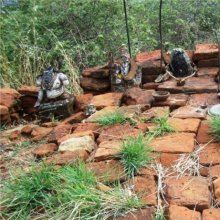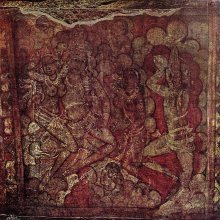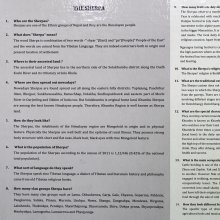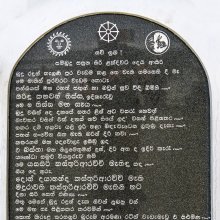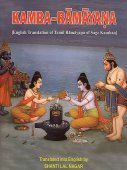Arrangement: 1 definition
Introduction:
Arrangement means something in the history of ancient India. If you want to know the exact meaning, history, etymology or English translation of this term then check out the descriptions on this page. Add your comment or reference to a book if you want to contribute to this summary article.
Images (photo gallery)
India history and geography
Source: Singhi Jain Series: Ratnaprabha-suri’s Kuvalayamala-katha (history)Arrangement (of ships, boats, sails) was part of the preparatory rituals performed before Sea-voyages in ancient India (known in Prakrit as: jattā, or Sanskrit: yātrā), and was vividly depicted in the Kathās (narrative poems) such as Uddyotanasūri in his 8th-century Kuvalayamālā (a Prakrit Campū, similar to Kāvya poetry).—Details of preparation for sea-voyage are given which include the following items relating to preparatory ritual and the equipment of the ship: [e.g., arrangement of boats or ships; ... arrangement of sails] [...]. When the ship was to take off auspicious musical instruments were sounded, conch-shells were blown, auspicious songs were sung, [...].

The history of India traces the identification of countries, villages, towns and other regions of India, as well as mythology, zoology, royal dynasties, rulers, tribes, local festivities and traditions and regional languages. Ancient India enjoyed religious freedom and encourages the path of Dharma, a concept common to Buddhism, Hinduism, and Jainism.
See also (Relevant definitions)
Full-text (+897): Racana, Vyuha, Paripati, Pratividhana, Vinyasa, Vakyavinyasa, Vidhana, Samvidhana, Vyavastha, Devahiti, Natakaprapanca, Vyutkrama, Vakyaracana, Parampara, Paranali, Sambharana, Saramjama, Sakatavyuha, Saranjam, Mumtajima.
Relevant text
Search found 277 books and stories containing Arrangement; (plurals include: Arrangements). You can also click to the full overview containing English textual excerpts. Below are direct links for the most relevant articles:
Chaitanya Bhagavata (by Bhumipati Dāsa)
Verse 3.4.442 < [Chapter 4 - Descriptions of Śrī Acyutānanda’s Pastimes and the Worship of Śrī Mādhavendra]
Verse 3.4.460 < [Chapter 4 - Descriptions of Śrī Acyutānanda’s Pastimes and the Worship of Śrī Mādhavendra]
Introduction to chapter 9 < [Chapter 9 - The Glories of Advaita]
Vakyapadiya of Bhartrihari (by K. A. Subramania Iyer)
Verse 3.12.25 < [Book 3 - Pada-kāṇḍa (12): Upagraha-samuddeśa (On Aspect)]
Verse 3.12.26 < [Book 3 - Pada-kāṇḍa (12): Upagraha-samuddeśa (On Aspect)]
Verse 3.12.18 < [Book 3 - Pada-kāṇḍa (12): Upagraha-samuddeśa (On Aspect)]
The Padma Purana (by N.A. Deshpande)
Chapter 61 - Hanūmat Falls Unconscious < [Section 5 - Pātāla-Khaṇḍa (Section on the Nether World)]
Chapter 47 - Kāmadā Ekādaśī < [Section 6 - Uttara-Khaṇḍa (Concluding Section)]
Chapter 3 - Rāma Enters Ayodhyā < [Section 5 - Pātāla-Khaṇḍa (Section on the Nether World)]
Mahabharata (English) (by Kisari Mohan Ganguli)
The Bhikkhus Rules (by Bhikkhu Ariyesako)
Traveling Together < [Chapter 2 - Relationships]
Part 1 - Australia < [Appendix D]
The Etiquette Of A Contemplative < [Appendix B]
Charaka Samhita and Sushruta Samhita (by Nayana Sharma)
Appendix 1 - Description of a Hospital < [Chapter 4]
The Medical Attendant < [Chapter 2]
War Surgeons < [Chapter 2]
Related products
(+1 more products available)
